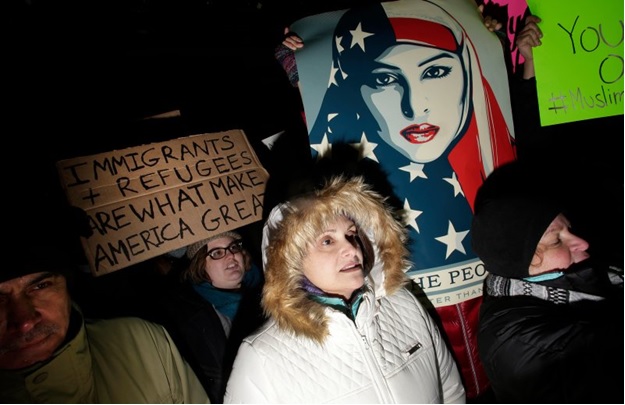By Sanya Mansooor, Times Magazine
Afnan Salem’s father, a Somali citizen living in Malaysia, has been waiting three years for United States immigration authorities to allow him to come to Ohio to live with his family. But Trump’s severe travel restrictions on many visas for those with citizenship from more than a dozen predominantly African and Muslim-majority countries, including Somalia, means he is, at least temporarily, barred from entry.

Joshua Lott—AFP via Getty Images
Under previous Administrations, Salem’s father would likely have been able to come to the U.S. without complications: Salem’s brother is a U.S. citizen and has filed for a visa on their father’s behalf. Trump’s travel ban—often referred to as the Muslim and African ban—changed that calculus, making it much more difficult, and often impossible, for family members from certain predominately Muslim and African countries to gain entry to the U.S.
Salem, a Somali-American 22-year-old student at Ohio State University, says the stringent restrictions send a message to her and those like her that Africans and Muslims are not welcome in the U.S, that “you don’t have the right to be reunited with your family because of your faith or where you come from.”
President-elect Joe Biden, who is expected to be inaugurated on Jan. 20, 2021, has promised to revoke the Trump-era travel ban on his first day in office—a commitment that families like Salem’s are desperately hoping he follows through on.
Even before President Donald Trump issued his first executive order attempting to establish a ban just about a week after his inauguration, he had called on the campaign trail for a “total and complete shutdown of Muslims entering the United States,” and falsely declared that “Islam hates us.” It was in this context that Trump began issuing executive orders to keep many Muslims from entering the U.S. (The first was introduced January 2017.) The first few early iterations of a travel ban were struck down by lower courts, but the Supreme Court upheld a recent version in 2018.
The impact of the travel restrictions has been far-reaching. Between Oct. 1, 2015 and Sept. 30, 2019 there was a decrease of 79% in visas issued to Iranians, 74% for Somalis and 66% for Yemenis, according to The Bridge Initiative, a research project based in Georgetown University that focuses on Islamophobia. In Jan. 2019, the libertarian Cato Institute reported that the new restrictions had already prevented more than 15,000 spouses and adopted children of U.S. citizens from joining their spouses or parents in the U.S. In Michigan, a Yemeni-American father and U.S. citizen Mahmood Salem committed suicide after his wife and two of his five children in Djibouti were denied visas under Trump’s travel ban to join him in the U.S., NBC reported.
“Each time the Muslim ban was reintroduced, it carried the same discriminatory intent, but changed its language and process in hopes that the courts would allow it to stand,” says Max Wolson, a staff attorney at the National Immigration Law Center.
Read the full piece: Joe Biden Has Promised to End Trump’s Muslim and African ‘Travel Ban
Source: Time Magazine


